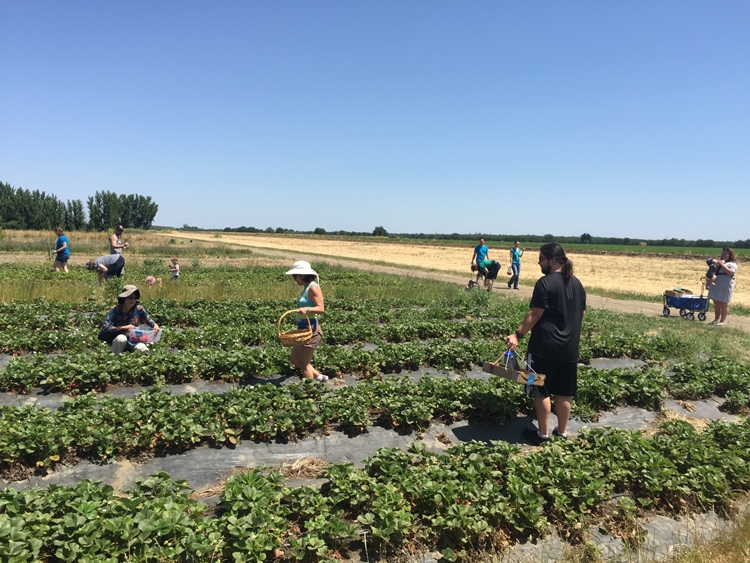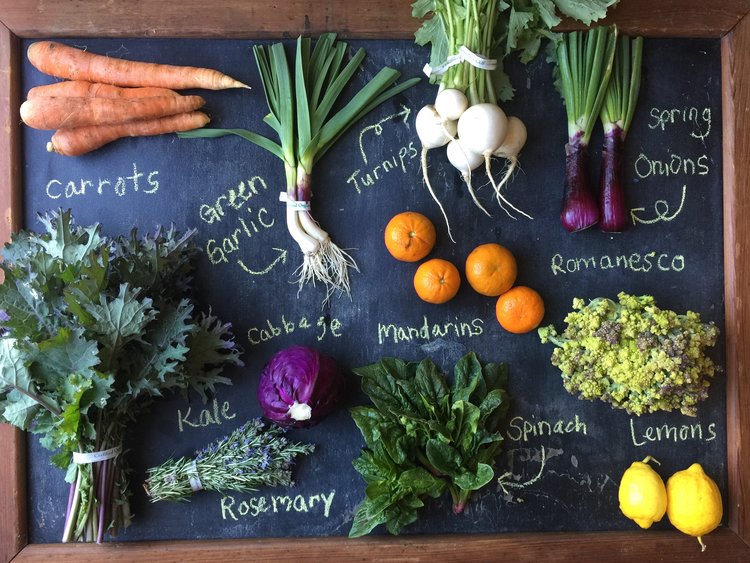
Courtesy of Eatwell Farm
We wanted to share with you some thoughts on ‘The Biggest Little Farm,’ which is currently playing in theaters and Cultivate Community Co-Op recently brought to The Empress Theatre in Vallejo.
Eatwell Farm owner Lorraine Walker saw the film and offers perspective as a local farmer not only on what the film covers about the importance of soil and regenerative farming, but also what it doesn’t cover — and why that knowledge is important.
At Sustainable Solano, we know the value of supporting small farms that use sustainable practices. These family farms are a pivotal part of building a food system that supports the local economy, builds local jobs and gives the buyer the benefit of the freshest produce. You can learn more about supporting local food at our Local Food Happenings page and by downloading our Local Food Guide.
Eatwell Farm, based on 105 acres in Dixon, offers CSA (Community Supported Agriculture) boxes of fresh, seasonal produce delivered to drop sites in the county. Boxes come in different sizes and at different frequencies to meet the needs of CSA members. By being a part of a CSA, members become part of supporting the farm and local food.
Here’s Lorraine’s insight on the film that she originally wrote for Eatwell’s CSA members, printed here with her permission:

Courtesy of Eatwell Farm
‘The Biggest Little Farm’
By Lorraine Walker, Eatwell Farm
Last week I went to promote our CSA at a viewing of ‘The Biggest Little Farm.’ I thoroughly enjoyed the film and related to many of their experiences. The movie had me reflecting on all the innovative things Nigel had done with our farm. He always considered our soil the life force from which all other life grows. After we began feeding our chickens whey, we realized a lot more was happening with our soil and Nigel made the decision to stop adding compost and other soil amendments. We now rely solely on our birds for fertility. Soil regeneration is probably one of the most important things we can do to save our planet. And listening to John Chester during the Q & A session after the movie, he certainly made that very clear.
As much as I loved ‘The Biggest Little Farm,’ there is one downside to the movie, and it is a big one: the lack of transparency about how much an operation like theirs costs. The movie is gorgeous, the land is gorgeous, the work they do is amazing. According to the LA Times: Apricot Lane is a small-scale farm, defined by the U.S. Department of Agriculture as earning at least $1,000 in gross income, but not more than $250,000, annually. John speaks openly of their investors, but not who or how much has been invested. I can’t begin to imagine the price for 200 acres an hour from LA in Ventura County. The orchard project in the first year, renting all that heavy equipment to pull out the trees, then move soil, create contours, wow. And the cost of new trees — do a quick little Google on that and you will find trees cost anywhere from $75 to over $100. Granted they were buying in quantity, but I am sure the trees alone were a fortune. And the beautiful building and worm composting operation, how I would love to have something like that here on our farm. But seriously, how much money was all of that?
According to that same LA Times article, they have 60 people working on the farm, including volunteers. On a farm that earns no more than $250,000 year, how many can earn a living wage? The idea that you can give up your city job and live the dream on a farm is so far from reality it isn’t even remotely funny. Sure if you have VC’s investing many, and I do mean many, millions of dollars, then maybe, but don’t you think at some point they would want to earn something back from that investment? The sad truth is, this beautiful movie makes farming look very doable, as long as you have enough grit. The reality is you need so much more than that, and you need a lot of customers.
Not showing the real financial struggles this type of farming is facing hurts us all. Right now Eatwell’s CSA is working on a goal of 150 new members, but the competition is heavy. There are many CSA options, plus all the home delivery from GoodEggs, WholeFoods/Amazon, etc., not to mention the fact that the greater population doesn’t even cook. We traverse a very thin line between charging enough to support the farm and keeping food somewhat affordable for many. Putting the pipe dream aside, the movie left me feeling hopeful and very appreciative for the message is does share, and that is the fact that regenerative farming is extremely important. Ecologically speaking we can literally change the world.
So go see the movie, be proud of your farm, enjoy watching all the wildlife living in and around Apricot Lane, and know that we too are a home for owls, hawks, bees, butterflies and many other happy animals here on your farm in Dixon.
If you’d like to read the full LA Times article here is a link.
And if you would like to support this type of farming here is a link to sign up for an Eatwell CSA share: eatwell.com
Interested in joining a CSA? Find out more on our website and check out our list of local farms that serve the county.

